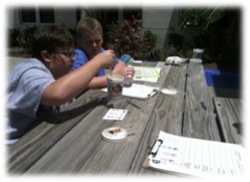Your school pond is an example of a freshwater resource. This study will help students understand the impact of their activities on water quality and the importance of protecting our watersheds. Activities include:
- Students will be introduced to Low Impact Design stormwater management techniques. (LID - Stormwater management modeled on nature)
- Fall: determine the health of the pond by testing chemical parameters of the water.
- Spring: study biodiversity - survey plants, animals and macro-invertebrates present in your pond. Calculate Pollution Tolerance Index
- Research best practices for urban landscaping and development comparing older retention ponds to new LID methods.
- Reflect how student behaviors contribute to the condition of the water and human impact on the watershed.

Great for Middle and High school studies.
Standards: SC.6.N.1.1, SC.6.N.1.2, SC.6.E.7.2, SC.6.L.15.1
SC.7.N.1.1, SC.7.1.2, SC.7.L.17.1, SC.7.L.17.3
SC.8.N.1.1. SC.8.N.1.2
SC.912.L.14.6, SC.912.L.15.3, SC.912.L.15.4, SC.912.L.15.5, SC.912.L.15.6, SC.912.L.15.7, SC.912.L.17.9, SC.912.L.17.13, SC.912.L.17.15, SC.912.L.17.17, SC.912.L.17.20.
Contact us for a grant writing template - SWFWMD Splash! Grants are due August 31, 2018
Standards: SC.6.N.1.1, SC.6.N.1.2, SC.6.E.7.2, SC.6.L.15.1
SC.7.N.1.1, SC.7.1.2, SC.7.L.17.1, SC.7.L.17.3
SC.8.N.1.1. SC.8.N.1.2
SC.912.L.14.6, SC.912.L.15.3, SC.912.L.15.4, SC.912.L.15.5, SC.912.L.15.6, SC.912.L.15.7, SC.912.L.17.9, SC.912.L.17.13, SC.912.L.17.15, SC.912.L.17.17, SC.912.L.17.20.
Contact us for a grant writing template - SWFWMD Splash! Grants are due August 31, 2018
